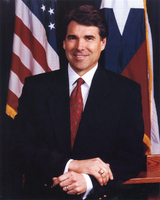Perry tells EPA that regulation of greenhouse gases will harm Texas economy
November 26, 2008
Preparing for a new administration in Washington, Gov. Rick Perry said Tuesday that regulating greenhouse gas emissions would have "devastating implications" for Texas' economy and energy industry. Although the Bush administration has rejected such regulation, President-elect Barack Obama is believed to be more receptive to clamping down on the gases that have been blamed for global wanning.
Written by Clay Robison, The Houston Chronicle

AUSTIN -Preparing for a new administration in Washington, Gov. Rick Perry said Tuesday that regulating greenhouse gas emissions would have "devastating implications" for Texas' economy and energy industry.
Although the Bush administration has rejected such regulation, President-elect Barack Obama is believed to be more receptive to clamping down on the gases that have been blamed for global wanning.
Perry said he plans to discuss his concerns with Obama next week. He is among several governors accepting an invitation to discuss the economic crisis with Obama and Vice President-elect Joe Biden on Dec. 2 in Philadelphia. Texas' economy continues to outperform the rest of the nation, Perry said. But, he warned, the regulation of greenhouse gases, as outlined in a notice posted by the outgoing Environmental Protection Agency administrator last summer, would run Texas "right off the tracks, into the ditch."
Perry said the advance notice of proposed rulemaking, posted in July, was a framework for imposing air quality permits and regulations on large swaths of the Texas economy, including commercial buildings, churches, small farms, hotels, hospitals and even large residential homes.
The governor said such federal regulations would hann the oil and natural gas production that is vital to the Texas economy and would jeopardize jobs in the coal industry. He said Texas needs to continue to rely on traditional energy sources as it works to expand access to wind, solar and other alternatives.
Environmentalists said the governor was shortsighted and overly alarmist.
"It (the EPA posting) is not a serious proposal," said Cyrus Reed, conservation director for the Lone Star Chapter of the Sierra Club.
But, he added, some regulation of greenhouse gas emissions is inevitable, thanks to recent court and administrative decisions, Obama's election and a larger Democratic majority in Congress.
"I don't think anyone thinks there will be permits for churches or small fanns," Reed said. "The major impacts will be on large coal plants."
Perry said diversifying the state's energy sources is a top priority and noted that Texas has installed more wind power than any other state and all but three countries. He also supports the development of "next-generation nuclear power plants" and "clean" coal plants.
But Texas' existing energy industry, he said, would be crippled and national oil and gas supplies would be curtailed if the federal government were to impose a large tax burden on oil and gas companies.
As a former animal science major at Texas A&M, Perry said, he was familiar with carbon dioxide, a major contributor to greenhouse gases.
"The idea that it has become a pollutant is a large stretch for some of us that have common sense," he added.
The U.S. Supreme Court ruled last year that the federal government had the authority under the Clean Air Act to regulate greenhouse gases as a pollutant, which President Bush has opposed doing.
"The federal court said you could, but didn't say you should," Perry said.
In May, an EPA appeals board overturned a permit for a coal plant in Utah because the application failed to require any controls on carbon dioxide pollution, Reed said.
Tom "Smitty" Smith, director of the Texas office of Public Citizen, a consumer advocacy group, said Texas has done a lot toward developing alternative energy sources but needs to do more.
Texas, he said, could create thousands of new jobs if it became more aggressive in developing wind, solar and other power alternatives.
"We disagree with the governor and others that coal and nuclear power are part of the solution," Smith said. "There is no such thing as clean coal."
![]()
![]()
Related Stories
![]()
Fair Use Notice
This site contains copyrighted material the use of which has not always been specifically authorized by the copyright owner. We are making such material available in our efforts to advance understanding of environmental, political, human rights, economic, democracy, scientific, and social justice issues, etc. We believe this constitutes a "fair use" of any such copyrighted material as provided for in section 107 of the US Copyright Law. In accordance with Title 17 U.S.C. Section 107, the material on this site is distributed without profit to those who have expressed a prior interest in receiving the included information for research and educational purposes. For more information go to: http://www.law.cornell.edu/uscode/17/107.shtml. If you wish to use copyrighted material from this site for purposes of your own that go beyond "fair use", you must obtain permission from the copyright owner.